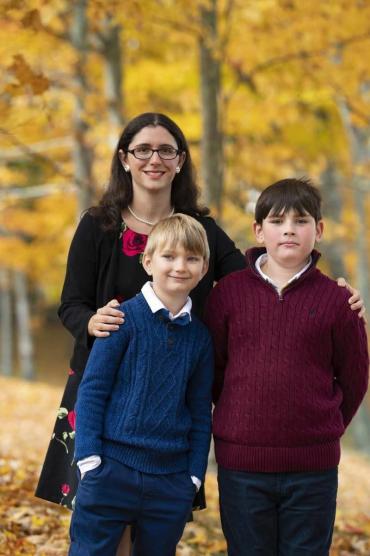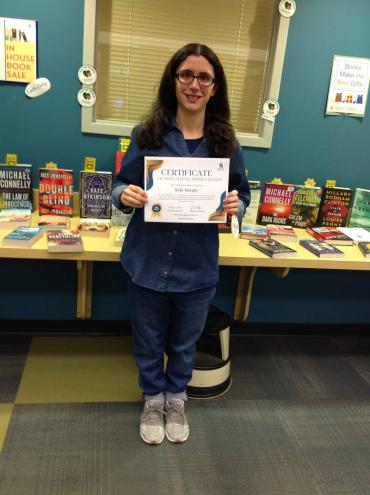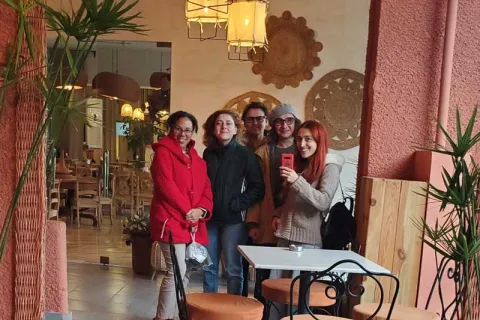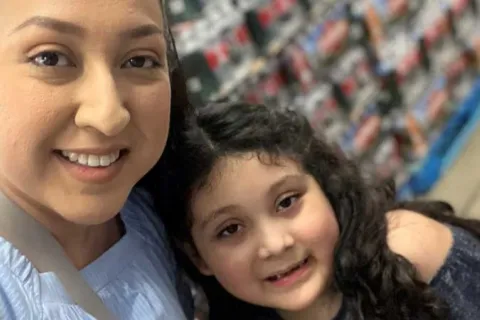Meet Kelly M.
Turning challenges into strengths as an autistic adult
Kelly M., 33
Being a fearless autistic adult means not letting your disability limit the possibilities of what you can do with your life.
From as far back as she can remember, Kelly has been using her positive attitude and strong willed nature as tools to navigate through life. Diagnosed with autism at age four and Type 1 diabetes at 20, the Georgia resident has had a knack for turning life’s challenges into personal strengths. Using her organizational skills and ability to prioritize daily tasks, Kelly effectively manages her diabetes, work schedule and everything in between.
Studies suggest that having autism may be associated with a higher risk of diabetes, a disease that occurs when your blood glucose, also called blood sugar, is too high, so Kelly stays vigilant in her maintenance routine to ensure she can continue a happy, healthy lifestyle. She credits Autism Speaks’ tips for autistic adults managing diabetes and tips on when and how to find a registered dietician for helping her find answers to some of the more intricate questions regarding health and wellness journey.
Kelly has spent much of her adult life as a passionate leader in the field of community service, dedicating her time to her public library, local art centers and the YMCA just to name a few. In 2023, she was recognized for her dedication to the community with a volunteer appreciation certificate from a local library, marking one of her proudest achievements of her adult life. When Kelly isn’t making a difference in her community, she is continuing her education via online college courses to expand her skillset for future employment opportunities and being the best aunt she can be to her two nephews.
Learn more about Kelly and her autism journey in this Q&A:
When did first understand what it meant to be autistic and how did that realization impact your life?
When I was a teenager, I considered learning how to drive a vehicle. Then, I realized my autism made it difficult because it became too stressful for me. I decided to forgo getting a license and stick to a state issued ID. This is just one example when I realized how my autism has impacted my life.
What type of services and supports have you received since being diagnosed?
I received special services during my public-school years. Each year, I had special accommodations such as extra time on tests, a pass to leave class five minutes early to avoid crowded hallways, and an IEP (Individualized Education Plan).
How does your autism make you unique?
I have an excellent memory. For example, I memorized all the best picture winners (Academy Awards). I also know all the state capitals and state nicknames.
What are some of your biggest strengths?
I’m great at organization, computer typing and solving puzzles.
What challenges have you faced with mental/physical health, and how have you overcome those challenges?
I was diagnosed with Type 1 diabetes in 2012. It has presented many challenges in the last twelve years. I like to think my autism helps me keep a strict regimen that is requires to control my diabetes. I am always very aware of what I need to have close by or things I need to do each day in order to feel comfortable that I can handle any issues that may arise.
What are you most proud of?
I’m proud of my volunteer work in the community. During the summer, I also helped at the YMCA by packing food kits for the county students. It does make me feel good to be appreciated for the work I’m doing. My goal is to continue volunteering at different places around my community to help those in need.
What is the best advice you’ve ever received?
Never let fear hold me back from anything I want to do.
What is the best advice you can give to other autistic adults?
Have faith and confidence in yourself. Do what’s right for you. You don’t have to be like anyone else. And don’t let others discourage you.











